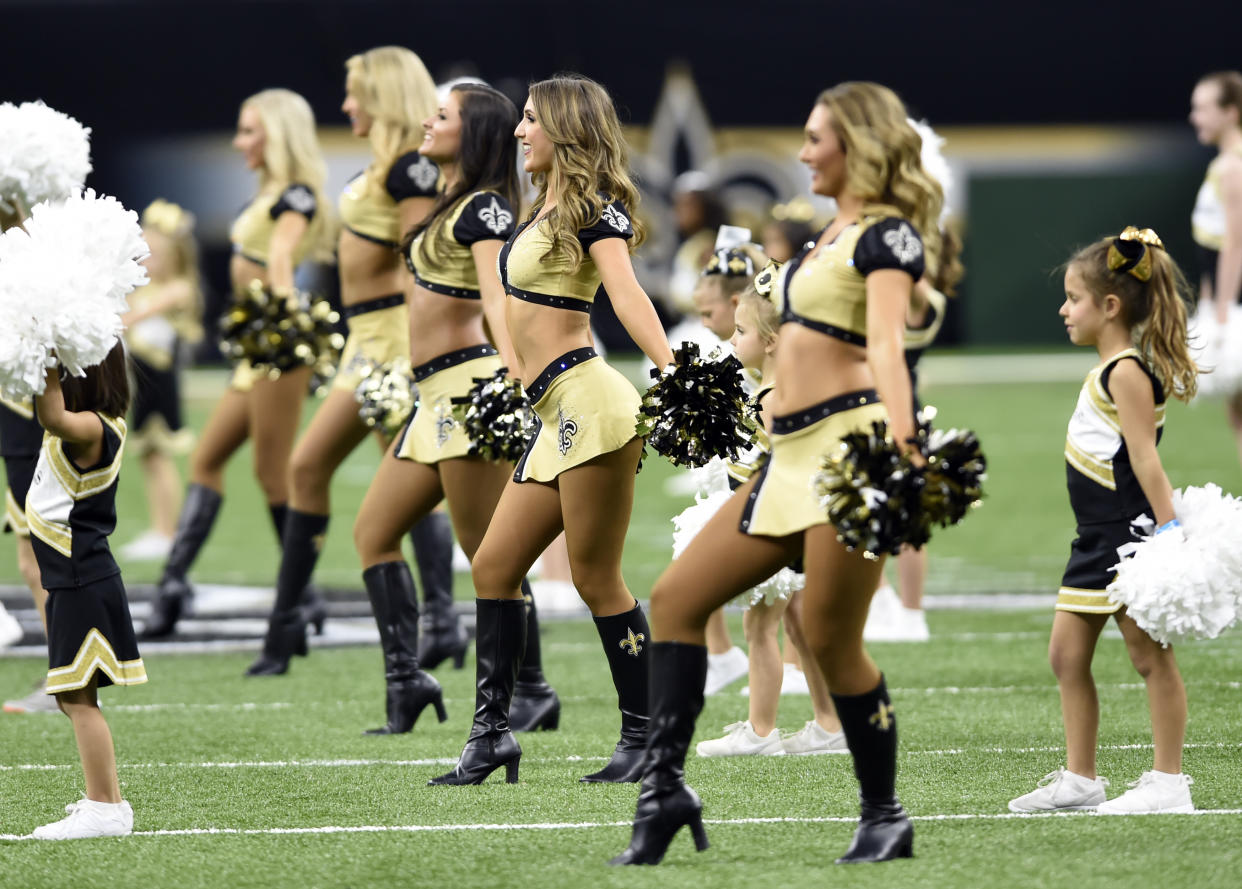Former Saints cheerleader accuses team of gender discrimination

In the past few years, NFL cheerleaders have been suing the NFL and their respective teams for fair pay. But the issues between teams and their cheerleaders don’t end there. Bailey Davis, a former New Orleans Saints cheerleader, is accusing the team of gender discrimination for having one set of rules for football players, and a different, more restrictive set of rules for cheerleaders.
The New York Times reported Monday that Davis, who had been fired from her job as a Saints cheerleader after three years, has filed a complaint with the Equal Employment Opportunity Commission. The complaint accuses the Saints of not just having two unequal sets of rules — one for women (the cheerleaders) and one for men (the players) — but of enforcing rules that reflect outdated views of women.
According to the Times, the Saints’ rules for cheerleaders contains an anti-fraternization policy that essentially forbids them from ever coming into contact with an NFL player off the field. They’re required to put all of their social media accounts on private and block NFL players from following them. They’re not allowed to post pictures of themselves in any Saints gear, or to post any pictures (on their private accounts!) of themselves in any revealing clothing. Davis told the Times that she was fired after posting a photo of herself in what the Times calls “a one-piece outfit.”
Davis was also accused of attending a party where other Saints players were present, which she denied. (The Saints admitted to her that they had no evidence she was present.) And that’s just part of the Saints’ very comprehensive anti-fraternization policy, which applies only to cheerleaders.
Cheerleaders are told not to dine in the same restaurant as players, or speak to them in any detail. If a Saints cheerleader enters a restaurant and a player is already there, she must leave. If a cheerleader is in a restaurant and a player arrives afterward, she must leave. There are nearly 2,000 players in the N.F.L., and many of them use pseudonyms on social media. Cheerleaders must find a way to block each one, while players have no limits on who can follow them.
The team says its rules are designed to protect cheerleaders from players preying on them.
The rules and restrictions the Saints place on their cheerleaders are definitely outdated. They assume that cheerleaders need to be protected in some way from football players, while football players are under no obligation to steer clear of them. It puts the burden entirely on the women, which is completely unfair. If, as the Saints say, NFL players could “prey” on cheerleaders, why are there no rules preventing them from doing so?
Additionally, the Saints’ restrictive social media rules don’t allow the cheerleaders to market themselves at all, despite being a public face of the team. Unlike football players, or even some of the mascots, cheerleaders aren’t allowed to have unlocked, public social media accounts. It’s like the Saints want them to be cheerleaders on the field (and dance in revealing costumes, which they’re not allowed to wear in any pictures on social media), but they don’t want them to talk about it or be publicly associated with the team whenever they’re off the field, which is most of the time.
There’s no telling how this suit is going to turn out. The Times spoke with legal experts who said that Davis could win if the Saints can’t prove why women need to be protected more than men, or if they can’t prove why their restrictive cheerleader rules are necessary to operate their business.
Saints cheerleaders are only allowed to work for the team for four years, so Davis would have had just one year left if she hadn’t been fired. She told the Times that she’s still likes the Saints, but that she filed her complaint with the hopes of making things better for all cheerleaders.
“I’m doing this for them so they can do what they love and feel protected and empowered, and be a female athlete and not be pushed to the side and feeling unimportant,” Davis said.
Davis is looking for equal treatment — for both players and cheerleaders to be held to the same rules and standards. That doesn’t seem like too much to ask.
– – – – – –
Liz Roscher is a writer for Yahoo Sports. Have a tip? Email her at lizroscher@yahoo.com or follow her on twitter! Follow @lizroscher
More from Yahoo Sports:
• Passan: The upbeat treament of Shohei Ohtani is an unnecessary joke
• Former MLB All-Star Albert Belle arrested on DUI
• Grayson Allen leaves behind complicated legacy at Duke
• Report: Odell Beckham won’t play without an extension


